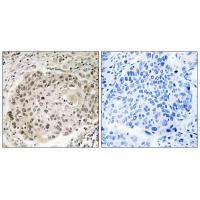
| WB | 咨询技术 | Human,Mouse,Rat |
| IF | 咨询技术 | Human,Mouse,Rat |
| IHC | 1/50-1/100 | Human,Mouse,Rat |
| ICC | 技术咨询 | Human,Mouse,Rat |
| FCM | 咨询技术 | Human,Mouse,Rat |
| Elisa | 咨询技术 | Human,Mouse,Rat |
| Aliases | Ubiquitin carboxyl-terminal hydrolase 36; EC 3.1.2.15; Ubiquitin thioesterase 36; Ubiquitin-specific-processing protease 36; Deubiquitinating enzyme 36 |
| Entrez GeneID | 57602; |
| WB Predicted band size | 125kDa |
| Host/Isotype | Rabbit IgG |
| Antibody Type | Primary antibody |
| Storage | Store at 4°C short term. Aliquot and store at -20°C long term. Avoid freeze/thaw cycles. |
| Species Reactivity | Human |
| Immunogen | Synthesized peptide derived from internal of human USP36. |
| Formulation | Purified antibody in PBS with 0.05% sodium azide. |
+ +
以下是关于USP36抗体的3篇代表性文献摘要:
1. **《USP36 stabilizes nucleolar Snail1 to promote ribosome biogenesis and cancer cell survival》**
- 作者:Pan, Y., et al. (2019)
- 摘要:该研究利用USP36抗体进行免疫沉淀和免疫荧光实验,发现USP36通过去泛素化并稳定核仁中的Snail1蛋白,促进核糖体生物合成,从而增强乳腺癌细胞的存活和化疗耐药性。
2. **《USP36 regulates mitotic progression by deubiquitinating and stabilizing Aurora A kinase》**
- 作者:Li, S., et al. (2020)
- 摘要:通过Western blot和免疫组化使用USP36抗体,研究发现USP36通过去泛素化Aurora A激酶(AURKA)维持其稳定性,调控有丝分裂进程,抑制USP36可导致结直肠癌细胞周期阻滞和凋亡。
3. **《Ubiquitin-specific protease 36 promotes colorectal cancer progression via Wnt/β-catenin pathway activation》**
- 作者:Zhang, Q., et al. (2021)
- 摘要:利用USP36抗体检测结肠癌组织中USP36蛋白表达水平,发现其高表达通过去泛素化β-catenin激活Wnt通路,促进肿瘤侵袭和转移,提示USP36可能作为结直肠癌的潜在治疗靶点。
这些文献均通过USP36抗体验证了该蛋白在肿瘤发生中的功能及分子机制。
The USP36 antibody is a research tool designed to detect ubiquitin-specific protease 36 (USP36), a member of the deubiquitinating enzyme (DUB) family. USP36 plays a critical role in regulating protein stability by removing ubiquitin chains from target proteins, thereby counteracting proteasomal degradation. It is primarily localized in nucleoli and is involved in ribosome biogenesis, cell cycle progression, and stress responses. USP36 has gained attention for its interaction with oncogenic proteins like c-Myc and NPM1. contributing to its implication in cancer biology, particularly in neuroblastoma, breast cancer, and other malignancies where dysregulated ubiquitination pathways are observed.
Antibodies targeting USP36 enable researchers to study its expression, localization, and functional mechanisms. These antibodies are typically validated in applications such as Western blotting, immunoprecipitation, and immunofluorescence. Studies using USP36 antibodies have revealed its dual role in both promoting and suppressing tumorigenesis, depending on cellular context. For instance, USP36 stabilizes oncoproteins like c-Myc to drive cancer progression, yet it also participates in nucleolar stress responses that may suppress uncontrolled growth.
The development of specific USP36 antibodies has advanced research into its post-translational regulation, including phosphorylation and protein-protein interactions. Such tools are essential for exploring therapeutic strategies targeting USP36-associated pathways in diseases linked to ubiquitination defects.
×